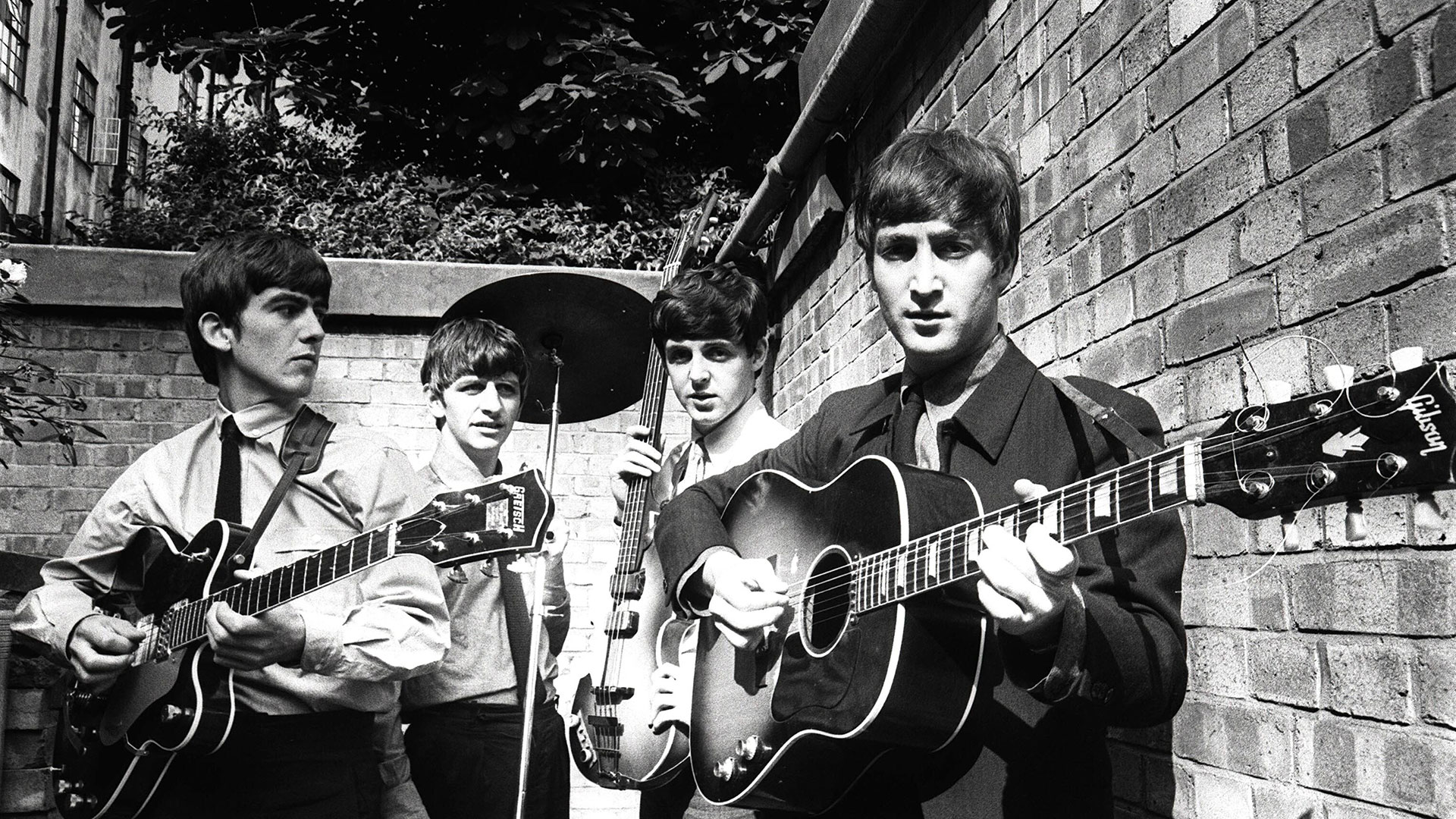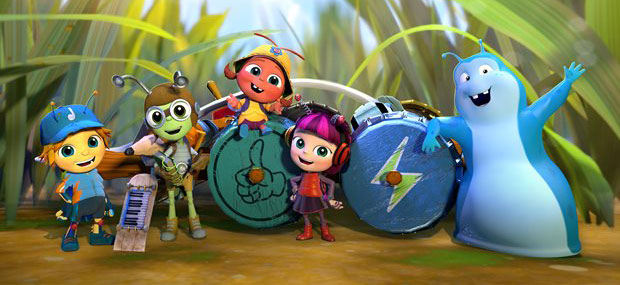Martin has two young daughters but he says he’s careful not to force The Beatles’ music on them. “It’s mostly Katy Perry and current pop, and I encourage that because it’s important to discover things in your own way, in your own time,” he says.
The producer admits he worries The Beatles’ mighty reputation could became so hallowed, so shrouded in reverence, it could stifle the most important thing: pure listening pleasure.
“A kid can listen to The Beatles and Radiohead and Justin Bieber and get enjoyment out of all three. The thing is, it’s not up to critics or music historians to decide anything. It shouldn’t be held as some kind of unassailable standard.
“My fear is that certain pop music becomes like classical music – people don’t want to accept new stuff because there’s a certain snobbery, you know, like, ‘We have our standards now, thank you very much. Rock music? Well, we have Led Zeppelin’. That said, I think The Beatles will last beyond us because people seem to get a huge amount of pleasure out of the music.”
Writer Jon Savage, author of England’s Dreaming, the best book ever written about punk, charts The Beatles’ involvement in the white heat of cultural experimentation in his new book, 1966: The Year the Decade Exploded. Savage finds it amusing to remember the only time in half a century – the end of the 1970s – when interest in the Fab Four had waned, and The Clash sang about how the “phoney Beatlemania has bitten the dust”.
Our 2020 Impact Report
The Big Issue has given more than £1 million support to Big Issue vendors struggling due to the lockdown restrictions. To mark the significant milestone, we have published an impact report, documenting the seismic shift the organisation has undergone in the past 12 months.
View ReportAdvertising helps fund Big Issue’s mission to end poverty
“The reputation was actually at quite a low ebb, as the punk and new wave bands around then were so busy trying to overthrow the previous generation,” the writer recalls. “But in the 1980s quite a few bands began to cover them, and then their stock began to soar into the 1990s, with The Beatles Anthology project and Oasis always talking about how much they loved them.
“The thing is, the music is fantastic – that’s why people are still obsessed with them,” Savage continues. “I still play the records and I still really enjoy them. It’s also just a fucking fantastic story. When you examine the story – four guys who took on the world by working as a team, each bringing something to the table, each supplying something the others can’t – it has a mythic quality, almost like The Wizard of Oz.”
Mark Lewisohn has spent more time pondering the story and researching The Beatles’ personal and professional history than anyone else. Lewisohn has embarked on a three-volume biography that he expects will finally amount to around 5,000 pages when it’s done (the first volume, Tune In, covers the Liverpool and Hamburg years in exhaustive and fascinating detail).
The author describes their output as “the greatest British contribution to 20th-century culture” and is confident the greatness is now secure for all time. “Having sustained such huge interest for half a century, one imagines it will go on and on,” he says. “Everything suggests they are now going to be listened to, talked about, studied and appreciated for a long, long time.”
The surviving members and the group’s holding company continue to search avenues that weren’t available to them in the mid-1960s
Why? Why the unending obsession, all over the world? “Well, the music they produced was very, very good,” he laughs. “It was of such astonishingly high quality – the composition, the originality, the creative ways they recorded – that it’s lasted through many fads and fashions.
“The interest is also partly about what they stood for: be true to yourself. It’s a great lesson in the TV talent show era because The Beatles created the music they wanted to – you couldn’t have possibly manufactured it.”
Advertising helps fund Big Issue’s mission to end poverty
The Beatles were the first global music phenomenon, which makes attempts to assess the band’s true impact all the more head-spinning. Historians in former communist countries are discovering how important they were in changing attitudes to the West among young people behind the Iron Curtain. Czech film director Miloš Forman has insisted The Beatles were “partly responsible” for the fall of communism.
Ron Howard’s new film shows the unsung role they played politically in America by insisting on the desegregation of concert venues in the South during their US tours. Larry Kane, a former news anchor and author of several Beatles books, spent a lot of time interviewing the boys during their stateside adventures in 1964 and 1965.
“They were spectacular, remarkable people – very smart and funny,” he says. “They changed a lot of things – fashion, the music industry, they changed how women expressed themselves in public, and they did have an impact on segregation. They couldn’t believe someone would be banned from certain seating areas because their skin had a different colour. They fought that and they won.”
The ongoing commercial success of music made in the 1960s is all the more remarkable considering The Beatles as a business entity was in tatters not so very long ago. Back in 1975, when The Beatles’ partnership was legally dissolved, the dissolution of the group’s chaotic company Apple Corps was considered. But John, Paul, George and Ringo agreed to keep it going as a small holding operation.
In 1995, The Beatles Anthology – a TV documentary, book and series of outtakes albums that went on to sell more than 15 million copies worldwide – relaunched Apple Corps as a money-making machine. Slightly ludicrously, The Beatles’ 1 album, a straightforward compilation of the band’s chart-topping singles, became the bestselling album of the 2000s. And when the back catalogue was finally released on iTunes in 2011, it was reported to be the most lucrative digital music deal in history (although the sum remains undisclosed).
Advertising helps fund Big Issue’s mission to end poverty
“Their financial impact today is bigger than any other artist, living or deceased,” says David Fiorenza, a Villanova University economics professor who specialises in entertainment. “The surviving members and the group’s holding company continue to search avenues that weren’t available to them in the mid-1960s. They’ve always been on the cutting edge.”
The tentacles continue to reach into new areas. Animated series Beat Bugs (above), now on Netflix, has licensed The Beatles’ tracks and used them to teach infants a range of life lessons in song. Each episode’s story is loosely based on a set of Lennon-McCartney lyrics: Pearl Jam’s Eddie Vedder sings Magical Mystery Tour and Robbie Williams tackles Good Day Sunshine.
“As a young parent I thought it would be great to have a show that would be engaging for kids and adults to watch together as a family,” says creator Josh Wakely. “The Beatles songs are full of these amazing melodies, and the messages in songs like All You Need is Love – that’s a pretty great message to teach your children. A bit like Shakespeare, I think people will be reinterpreting The Beatles’ work hundreds of years from now.” Giles Martin considers Paul McCartney “something of a pied piper genius” for writing songs with such vivid and colourful images to enthral successive generations of children.
It’s enough to make you believe in the inevitability of The Beatles’ elevated status, a masterplan for the ages. But there never was one. Back in 1964, McCartney was asked whether he thought The Beatles would have a place in the history of western culture. “Culture? It’s not culture – it’s just a good laugh.”
It was, says Giles Martin, a tremendous attitude. We should all be grateful the little rock and roll band from Liverpool were too quick, too curious, too unpretentious, spontaneous and wildly creative to ever become burdened by the weight of expectation.
“Although they all took recording sessions seriously, my dad always said that they were never trying to make these great, mighty bastions of popular culture. They were too busy having fun and trying to do something new to amuse themselves to worry about all that.”
Advertising helps fund Big Issue’s mission to end poverty











